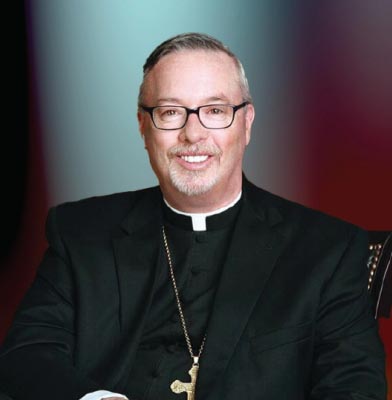 by ARCHBISHOP CHRISTOPHER J. COYNE
by ARCHBISHOP CHRISTOPHER J. COYNE
Over the past year, the vocations effort within the Archdiocese of Hartford has born great fruit with over 60 men coming forward to say they are considering priesthood. The initial prayer and discern-ment from this group has led to the largest number of applicants for entrance into seminary formation than we have had in years. This is in large part due both to the prayers for vocations to the priesthood that we have been undertaking at the end of Mass and a real investment by Archbishop Leonard P. Blair in staff and resources directed toward fostering vocations.
In my travels throughout the Archdiocese, I have had a number of opportunities to speak with communities and parishes about vocations, with some good feedback. While everyone is very supportive of this effort, there are some who feel that our prayer should be directed towards encouraging all vocations within the Church — deacons, religious, catechists, chaste singles, marriage, widows and widowers, etc. — and not just priests. While I certainly agree with their point in the long run, in the present moment there is an acute need for priests within our Archdiocese that has to be addressed head on. This particular effort towards fostering priestly vocations does not preclude prayers for all of the other vocations within the Church. This expansion into a consideration of all the vocational calls within the church points to an even greater and more foundational call that links all of our vocations and life as a Church together. That is the call to discipleship, to follow the Lord Jesus with all our hearts, with all our souls, with all our works and words, with all our being — to know Him, to serve Him, and to love Him along whatever life’s path we are. Every call that follows — priesthood, religious, lay, etc. — must have the basic call to discipleship. That call forms and guides all others.
St. John Paul II in his exhortation on priestly formation, Pastores dabo vobis, wrote of the basic human qualifications that are necessary for those men seeking to be priests. He said that they should first be well-formed human beings, “balanced people, strong and free, capable of bear-ing the weight of pastoral responsibilities. They need to be educated to love the truth, to be loyal, to respect every person, to have a sense of justice, to be true to their word, to be genuinely com-passionate, to be men of integrity and, especially, to be balanced in judgment and behavior.” Of additional importance is the capacity to relate to others along with an awareness that love — love that involves the entire person, in all his or her aspects, physical, psychic and spir-itual — has a central role in human life. But most especially, he must be a believer, a disciple, someone who has been an active member of his parish or faith community, someone who is called from Communion. Still, isn’t that true for each of us? In light of this, perhaps our prayer for vocations should start with a personal one, that each of us may be a disciple of Christ in all that it means and then listen to the call of faith that beckons to each of us.
